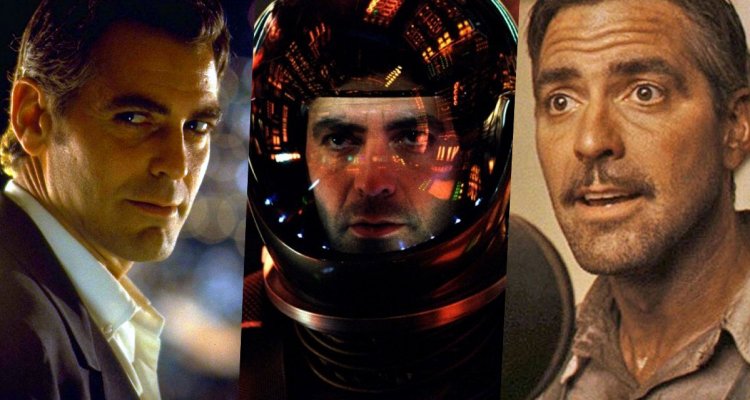“Solaris” (2002)
Initially, Steven Soderbergh and James Cameron‘s take on Andrei Tarkovsky‘s beloved 1972 adaptation of Stanislaw Lem‘s novel was envisioned as a heady mixture of “2001” and “Last Tango in Paris,” featuring graphic sex sequences in a dreamy sci-fi setting. Somewhere along the way this idea was dropped (the finished product features precious little sex) and it is largely remembered now as the movie that was threatened with an R-rating because you could see George Clooney‘s bare ass for a few fleeting moments. This does a great disservice to both Clooney’s performance, as a psychologist recruited by a shadowy corporation to investigate some mysterious happenings on an orbiting space station, and the movie itself, a haunting, super-spooky, ultra-emotional sci-fi classic (or you could call it an existentialist romance picture set in space) that has gone largely unnoticed by audiences. The story unwinds after Clooney’s character gets to the space station, where he’s confronted by the apparition of his wife who committed suicide several years earlier; it seems the titular planet the station is orbiting has the ability to manifest dead loved ones, which has caused many of the astronauts to go bonkers (or worse). Clooney gets sucked into this pseudo-relationship with willful abandon, and one of the movie’s chief virtues is that it beautifully portrays the way that memory works, particularly within relationships, and portrays a tantalizing what-if situation: what if you could have a do-over on a doomed relationship? Soderbergh’s chilly photography (and the eerie score by frequent collaborator Cliff Martinez) counterpoints the movie’s emotionality, embodied by Clooney as a clinical professional giving in to wild desires. The movie is a gorgeous, nuanced take on the material, deftly plotted but luxurious in its exploration of the darker sides of the human heart. One day “Solaris” will be appreciated and remembered, right alongside the original, at about the same time people stop talking about Clooney’s butt.
“Michael Clayton” (2007)
Like all the great movie stars, George Clooney has a defined persona: suave, handsome, successful, confident, the closest thing we have to Cary Grant these days. And like most great stars, Clooney knows that he can be most effective when playing against that persona. Only a few months after the ‘Ocean’s’ franchise came to a close, he took on another smooth operator, but one who is the polar opposite of Danny Ocean — the title role in “Michael Clayton,” the directorial debut of ‘Bourne’ screenwriter Tony Gilroy. A life-long “fixer” for a high-priced law firm, who uses his connections to bail out his employer’s shady clients, Clayton is distanced from his own family, divorced and deeply in debt, principally thanks to his no-good brother; he’s in desperate need of his own fixer. When his close friend and mentor Arthur Edens (an Oscar-nominated Tom Wilkinson) goes off his meds and attempts to sabotage a multi-million dollar lawsuit against an agrochemical company, he’s confronted with a moral crisis that strikes at the very core of his identity, and becomes embroiled in a life-threatening conspiracy. You can tell that Clayton was once as charming as anyone Clooney’s ever played, but life has taken its toll. He’s now a conflicted man disgusted at what he’s become, at what he’s willing to betray in himself and in his friends. Redemption, when it comes, isn’t easily won — just watch him during the brilliant closing credits, which feature a single take of Clooney in a cab. It’s perhaps the actor’s most soulful performance (although “The Descendants” gives it a run for its money), the palpable sense we get of a man rotting slowly from the inside is something quite extraordinary. He received his first Best Actor nomination for the part, and in any year where he wasn’t pitted against Daniel Day-Lewis‘ titanic Daniel Plainview, would have walked away with the statue.

